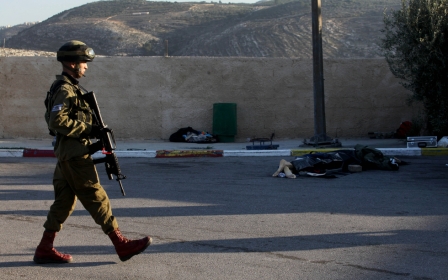Obama meets Israeli president Rivlin at White House

US President Barack Obama used a White House visit by Israel's president on Wednesday to call for steps to prevent a deeper crisis between Israelis and Palestinians.
Welcoming Reuven Rivlin to the Oval Office, Obama acknowledged a decades-old peace process was in deep-freeze, but he urged all sides to ease tensions.
"Obviously this is a time at which the prospects of a serious peace may seem distant, it's important that we continue to try," Obama said.
Since 1 October, daily attacks and clashes between Palestinians and Israelis have killed 113 on the Palestinian side, 17 Israelis, an American and an Eritrean.
Many of the Palestinians were alleged attackers, but dozens were also shot dead by Israeli forces during army raids and protests in the occupied West Bank and Gaza.
In the latest incidents, an Israeli former member of the Jewish Underground militant group was shot and injured in a drive-by shooting in the northern West Bank, Maan News Agency reported. Earlier, a Palestinian was shot and killed by Israeli forces in Hebron after allegedly attacking two Israeli settlers.
"I've been very clear in condemning the violence that is recurring inside of Israel, the need for leaders like (Palestinian) President (Mahmoud) Abbas to unequivocally condemn the violence that has been taking place and the need to end incitement," Obama said.
"But also the need for Israelis and Palestinians to find mechanisms in which to dialogue."
Obama has admitted there will be no lasting solution to the conflict during the year he has left in office.
Before heading to Washington, Rivlin called for out-of-the-box thinking, while seemingly ruling out the prospect of a permanent peace deal any time soon.
"What is the positive legacy we will bequeath to future generations in terms of the Israeli-Palestinian conflict?" he asked in a Washington Post editorial.
"I regret to say it does not appear that we will be able to bequeath them peace - but we can leave them other breakthroughs. Even if these are localised or embryonic, we can build trust between the two peoples and leaderships so that they will not begin like us today, starting from scratch."
Close ties
Both Obama and Rivlin stressed close ties between the United States and Israel.
Obama was keen to show that his poor relations with Israeli Prime Minister Benjamin Netanyahu are not indicative of broader US-Israel ties. While an April poll suggested that Israel had become an increasingly partisan issue in the US, Obama downplayed this.
"We consider our commitment to Israel's security to be one of the most important principles of American foreign policy, one that is shared by Democrats and Republicans alike," Obama said.
The White House had been infuriated by Netanyahu's decision to appear in Congress at Republicans' invitation, where he urged US lawmakers to vote against a deal to curb Iran's nuclear programme.
Obama views the deal as a signature achievement that will close down Tehran's pathway to getting a nuclear bomb.
Netanyahu had also caused consternation at the White House by declaring during an election race that there would be no Palestinian state on his watch, although he later backtracked.
In contrast, Rivlin was effusive in his praise of Obama, saying "the obvious should be said from time to time and even be written: Israel has no greater friend than the United States".
New MEE newsletter: Jerusalem Dispatch
Sign up to get the latest insights and analysis on Israel-Palestine, alongside Turkey Unpacked and other MEE newsletters
Middle East Eye delivers independent and unrivalled coverage and analysis of the Middle East, North Africa and beyond. To learn more about republishing this content and the associated fees, please fill out this form. More about MEE can be found here.



